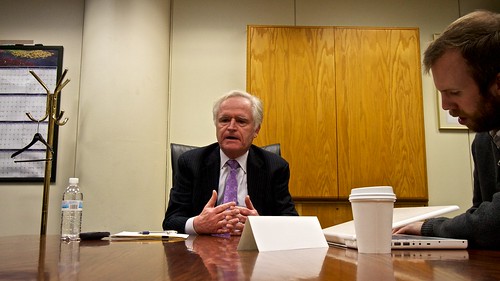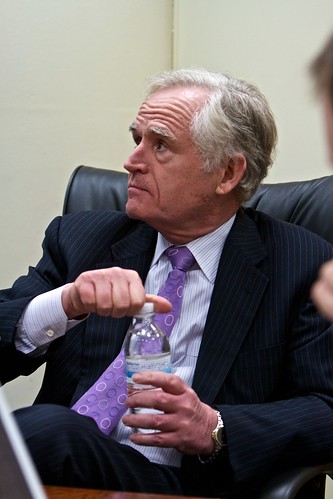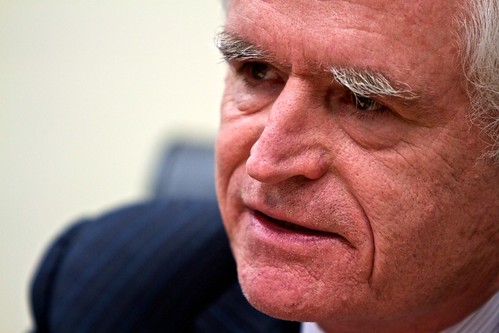
‘Metro Blogger Roundtable’
courtesy of ‘Samer Farha’
Last week, Metro’s new, permanent General Manager and CEO Richard Sarles held a blogger roundtable to talk about system safety, improvements in customer service, and bag searches. You probably read about it here and there, so I’ll leave the recap to below the fold and tell you about my impressions of Sarles and why I think he’s going to be the most important head of the system for the foreseeable future.
Sarles is a relatively soft spoken guy, but he’s got a gravitas that lets you know he’s both in charge and very well versed in the details of the system he runs. He’s also very much an engineer, having come to management at NJ Transit later in life. He understands the system, and strikes a pragmatic tone in his talk with us.
He brings that engineering background to the role of GM, and already has a systemic plan to return the system to what’s referred to as a “state of good repair.” That means, essentially, that the critical systems of transporting people have to be well maintained so that they do not pose either a safety or breakdown hazard. And that’s a long way away.

‘Metro Blogger Roundtable’
courtesy of ‘Samer Farha’
I think Sarles has the knowledge and the leadership to get the system back into the state of good repair. I also think he’s very focused on customer service, and that the board has finally chosen a transit leader that understands the minutiae of the system. If he succeeds, and I think, with one exception, he has all the tools in front of him to do so, he will have turned around a system that is seriously broken, and will have laid the groundwork for the system to thrive for years to come. In essence, he will have reset the clock on the decay and failure of the last two decades.
I believe Sarles not only deserves our respect, but deserves good will and space to act that I don’t think any of the last three GMs deserved. Don’t get me wrong, this isn’t going to be a cake walk, and it isn’t going to be done soon (maybe not even during his tenure). Neither we (the blogging community) or you (the riding public) should feel afraid to criticize or push WMATA on what’s needed. But we should keep in mind that these changes take time and money, both of which are in short supply.
“This whole catching up — state of good repair — it is something that’s not going to turn around in six months or a year,” said Sarles. “It’s not a sprint, it’s a marathon. And we’re going to be running a long marathon here.”
He’s very serious about that statement, too. “Look at the Red line, that’s 35 years old. This place has got to be rebuilt. [It] has the heaviest traffic, it’s the oldest part of the system, and we’re in the process of rebuilding it.”

‘Metro Blogger Roundtable’
courtesy of ‘Samer Farha’
The timelines aren’t fast, either: “We’ve got another two years to go on the Red line contract … then we’re moving on to the Blue and Orange lines … and that’s going to go on for another three or four years to rebuild that line.” Some of that work will overlap, but construction and weekend and evening closures look like they are going to be with us for at least the next five years.
And what of money? With a budget slashing Congress in place, and the economy not rebounding as quickly as some had hoped, what happens to Metro if promised funds don’t show up?
“With what’s going on in Congress right now, there’s the potential that all the plans we laid last year could unravel,” says Sarles matter-of-factly.
“We will not catch up [to the state of good repair],” he continues, more somberly. “It’s devastating. Unless someone else wants to give us that kind of pot of money, there’s no place else to go.”
I can’t stress this enough: we, the riders of the system, have to ask our members of Congress to not cut Metro’s funding. You can’t have it both ways. You can’t demand smaller budgets and lower taxes without losing something. For those of us that rely upon Metro to get us to and from work, for this region and its economy, we can’t sit by and not act. Metro has no options. It wouldn’t be viable at $10 a ride, and there are no other sources of funding.
More than the accidents and the delays, more than the crowding and the nightmare commutes, funding remains the number one problem for the agency. And this is something that, no matter the engineering, is not entirely in Metro’s or Sarles’s hands. If you want to see the system and this GM succeed, you need to get involved, too.

‘Metro Blogger Roundtable’
courtesy of ‘Samer Farha’
And now that I’m off my soap box, here’s a quick summary of other topics of interest:
“CEO”: Sarles is the first Metro GM to have the title Chief Executive Officer since Richard White. “By adding the title … reinforces that fact that the CEO is going to act like a CEO here and run the organization. And the board has indicated they are going to focus on policy, and governance and monitoring.”
On bag search, which we discussed at length: Sarles indicated that he was briefed, in depth, by the Metro Transit Police Chief on the use of bag searches, and that he authorized them. His defers to anti-terror experts in this, and says the belief is that terrorists like to have a routine and do not like it when their routine is broken. That’s exactly what I want to hear from the CEO, but I still believe they are wrong on this. Here’s Bruce Schneier on this subject. I’d recommend you refuse a search and force the agency to rethink their plans, but I like tilting at windmills.
“People want to do something here,” said Sarles, all but admitting this was security theater. “We are the nation’s capital, we are the symbol here of a great country, and we call ourselves America’s subway. I can tell you that we are something that people would like to attack.”
I’d expect to see the bag searches used in limited fashion, especially around the “special times” (holidays, significant dates, etc).
On escalators: Sarles is aware of the problems. He’s elevated the escalator group to a more prominent position in the organization. The first big escalator project will be the replacement of the ones at Foggy Bottom, which Sarles says will take about a year and will include adding stairs as well.
On the number one issue: According to Sarles, the number one issue that riders report having problems with is … trash. Are you kidding me? Who are these riders? My guess is this is partly due to what people feel Metro can control and so they complain about that when asked, versus not complaining about other things. Like service.
The final word: I expect that Metro is going to be doing more outreach. This meeting was called at the last minute, and the attendance showed. I was told this is because of Sarles’s schedule, and the difficulty of finding one hour to do this. But Sarles has also been out and about, meeting riders on the Metro during rush hour last week. And he rides the system regularly. I think he understands that while the system is being rebuilt, the best way to gain favor with riders is not to lie to them about the pain they are feeling, but, rather, to listen and to be sincere in their answers.
Pingback: Tweets that mention Talkin’ Transit: Sarles in Charge » We Love DC -- Topsy.com
Funding is definitely a huge problem, as is maintenance, and given today’s suggestion that they may cut late-night service, I’m growing more worried about the future of Metro, not less. This interview makes me feel a bit better about Sarles, but I still find it highly disturbing that he is in support of the money-wasting security theater that is random bag searches.
On the money front, one main issue I see is that Farha encourages us to “have to ask our members of Congress to not cut Metro’s funding.” When such a large number of WMATA’s customer base consists of D.C. residents who *have* no members of Congress (let’s not lie to ourselves about Norton), that doesn’t leave us with much hope.